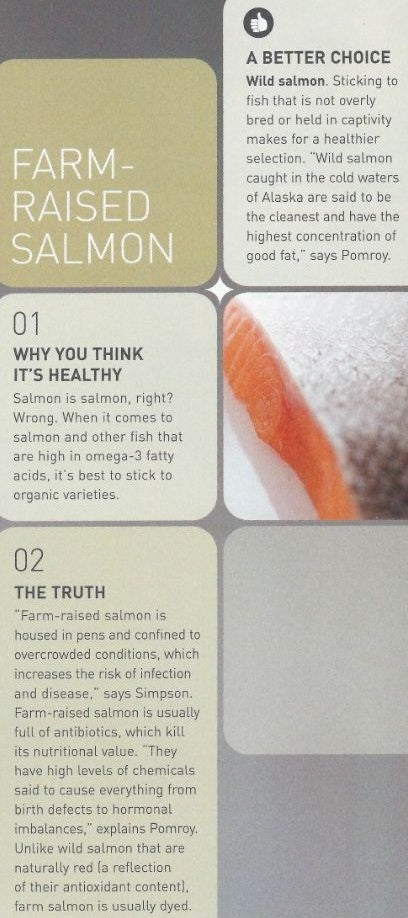
Granola
Why You Think It's Healthy
The thought of granola conjures up the idea of heath-conscious eating, but chances are the store-bought granola you're snacking on is full of empty calories.
The Truth
Granola, which is technically a carbohydrate, can be full of unhealthy ingredients like oils, sugar, and nuts (nuts are good in moderation). "Granola, especially granola bars, can be a killer, and many of them lead to weight gain since they can have a higher sugar and refined carb concentration than popular candy bars," says Los Angeles nutritionist Haylie Pomroy. That's not to mention the loads of honey and sugar that are use as "sticky" agents to form little granola clusters.
A Better Choice
Make your own or opt for sugar- and oil-free varieties. If you're a die-hard granola fan, it's best to make your own--this way, you can eliminate unnecessary sugars and oils. Two Moms in the Raw granola is voud of refined sugardsa and oil and it followes the principles of eating raw.
Farm-Raised Salmon
Why You Think It's Healthy
Salmon is salmon, right? Wrong. When it comes to salmon and other fish that are high in omega-3 fatty acids, it's best to stick to organic varieties.
The Truth
"Farm-raised salmon is housed in pens and confined to overcrowded conditions, which increases the risk of infection and disease," says Simpson. Farm-raised salmon is usually full of antibiotics, which kill its nutritional value. "They have high levels of chemicals said to cause everything from birth defects to hormonal imbalances," explains Pomroy. Unlike wild salmon that are naturally red (a reflection of their antioxidant content), farm salmon is usually dyed.
A Better Choice
Wild Salmon. Sticking to fish that is not overly bred of held in captivity makes for a healthier selection. "Wild salmon caught in the cold waters of Alaska are said to be the cleanest and have the highest concetration of good fat," says Pomroy.
Agave Nectar
Why You Think It's Healthy
Touted as a natural sugar, low-glycemic agave nectar is sourced from the agave plant--the same one that tequila is made from.
The Truth
Just like sugar, agave nectar makes food taste sweet. But, here's the kicker: In order for agave nectar to act as a sweetner, it has to be boiled down and concentrated, turning it into a liquid form of sugar--almost all types of agave nectar have the same consistency as honey. "In its pure form, agave nectar is very low in sugar and has a slow rate of delivery, or glycemic rate," says Pomroy."But heating, processing and concentrating the sweet part of it gives agave nectar a 90-percent fructose concentration." Adds Simpson, "It's basically 100-percent sugar, and its calorie content is the same as any other sugar product."
A Better Choice
Raw honey, coconut sugar, xylitol or stevia. Both honey and stevia, natural sweeteners, are best to substitute for agave nectar since they contain fewer calories and are natural, meaning the body can break them down better.



Share:
It’s an Easy DIY at-home Cleanse
Slim Tip